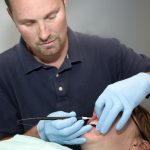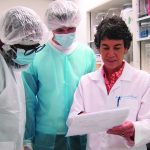SOUTHERN DERMATOLOGY &
SKIN CANCER CENTER
For more information about skin conditions and their treatment, contact:
SOUTHERN DERMATOLOGY and SKIN CANCER CENTER
An Affiliate of Anne Arundel Dermatology
Gregory J. Wilmoth, MD
Eric D. Challgren, MD
Margaret B. Boyse, MD
Laura D. Briley, MD
Tracey Cloninger, PA-C
Stephanie S. Pascale, MSN, FNP-C
4201 Lake Boone Trail, Suite 200
Raleigh, NC 27607
Telephone: (919) 782-2152
THE SKIN RENEWAL CENTER AT SOUTHERN DERMATOLOGY
4201 Lake Boone Trail, Suite 207
Raleigh, NC 27607
Telephone: (919) 863-0073

“There really is no question,” says Dr. Gregory Wilmoth of Southern Dermatology and Skin Cancer Center in Raleigh, “about the value of exercise for overall health—and that includes skin health. We all know that exercise is essential for cardiovascular health and to help maintain range of motion. It increases blood flow, which helps nourish skin cells and keep them healthy. Blood carries oxygen and nutrients to working cells throughout the body—including the skin. It has the effect of cleansing our skin from the inside.”
Connecting Exercise and Skin Health
While exercise is part of the foundation for healthy skin, for many of our patients, it also plays a special role,” says Dr. Wilmoth. “That is because the connection between skin and movement works in both directions.
“Our skin is a reliable indicator of overall health,” he notes. “And an unhealthy lack of motion in our lives is reflected in the condition and appearance of the skin. Sedentary people often have skin that looks less healthy, with an almost doughy appearance and signs of decreased skin integrity.
“At the same time, you can make a good argument that some skin problems make it difficult to engage in exercise. That is certainly something we have observed with patients suffering from psoriasis and atopic dermatitis. The embarrassment of unsightly lesions is a real issue for some, preventing them from engaging in many outdoor activities,” says Dr. Wilmoth. “They’ll be reluctant to wear shorts or play golf or swim or take a yoga class. It’s not a small thing; it’s an important quality-of-life-issue.
“Happily, one of the most significant benefits of new biologic medicines to treat skin diseases is to address that quality-of-life issue (see below). These drugs offer patients the gift of clearer skin, and—not incidentally—the freedom to move, to engage in sports, and in activities where the embarrassment of skin lesions restricted them in the past. Psoriasis patients using these new medications, for example, are often 100 percent clear of psoriatic lesions; previous treatments claimed success with only 50 to 75 percent clearance.”
Sharper Tools in the Medical Toolbox
Medical research is a continuous process of discovery and learning, notes Dr. Wilmoth. “And while progress in drug development can be painstakingly slow, when the eventual result is a new medication with higher efficacy than anything we’ve had before, millions of lives can be changed.
“That has been the happy outcome from the development of a new class of medications called biologic drugs,” he says. “For patients suffering from chronic conditions—such as psoriasis and eczema—these new drugs are life-changing.”
Targeting the Immune System
“Many chronic skin conditions are primarily caused by a dysfunctional or over-active immune response,” explains Dr. Wilmoth. “And, previously, the only treatments available were general immunosuppressants. Someone with psoriasis, for example, would get corticosteroids, which would tell the whole immune system to calm down, be less active—alleviating symptoms—but the treatment didn’t address the cause of the disease. So, when the biologic class of drugs came out, they literally changed the whole approach to psoriasis. These were the first drugs to target the specific part of the immune system causing the problem, and the results in treatment far surpassed our highest hopes when using topical or oral steroid treatments.”
Dr. Wilmoth notes that another newer biologic, Dupixent, has been extremely successful in treating atopic dermatitis and eczema. “It’s the first time we’ve had anything new to offer in eczema in years,” he says. “And it’s a really good example of a drug that has very few side effects and is very effective. Previously, with eczema, we didn’t have any other drugs that weren’t very harmful to take. Now, instead of giving patients rounds of oral and topical steroids or other meds that suppress the immune system, I can offer them a monthly injection that gives them nearly clear skin.”
Other biologics can be transformative for different dermatological conditions, notes Dr. Wilmoth, “and one notable example is chronic, idiopathic hives—where there’s no known cause. With people who’ve had hives for greater than six weeks, most of them may have produced antibodies that are triggering the hives, so the condition persists—and it’s a miserable condition.
“These patients used to have to live on Benadryl just to get through the day. Now there is a new medication called Xolair, which is given by a monthly injection, and it’s amazing. We have patients who have itched for 10 years or more, and this just fixes it; it gives them their lives back.”
Ever-Expanding Options
“While biologics are old news now,” says Dr. Wilmoth, “they were a huge and still relatively recent breakthrough in the treatment of psoriasis and eczema. More importantly, they continue to evolve. New biologic drugs continue to come out every year, giving even more opportunity for patient specific treatment. Often one drug from this class will work wonders for one patient, but the next responds better to another. We don’t understand fully what makes the difference, other than knowing that everyone’s body, chemistry, and genetics are different. So it’s of enormous benefit that new biologic medications continue to be developed and expand the medical tools we have available to help our patients.”
Stress, Weight, Movement, & Your Skin
Perhaps the most important benefit of exercise, observes Dr. Wilmoth, is its ability to reduce stress. “Movement,” he explains, “generates endorphins (those ‘feel-good’ hormones), which can improve mental health and, at the same time, can help calm the fight-or-flight stress response in your body. In fact, exercise is one of the most effective stress management techniques we have.
“That’s important, because stress generates systemic inflammation which is a trigger for many chronic skin conditions, including acne, rosacea, eczema, and psoriasis.
“Psoriasis is particularly good example of the many connections between exercise and skin health. That’s because exercise not only reduces stress but helps keep weight under control,” he explains. “Psoriasis not only responds to stress, but it worsens with more fat in the body. Fat cells produce a protein called TNF alpha that is elevated in psoriasis. The more fat cells you have and the bigger they are, the more TNF alpha you produce—which causes more inflammation in the body. And by engaging in more exercise and focusing on diet, psoriasis patients can help decrease those inflammatory markers.”
The Healing Loop
“Exercise is a key component of what I would call a ‘healing loop’”, says Dr. Wilmoth. “Exercise contributes to cardiovascular health, better circulation, stress reduction, less inflammation, and healthier skin tone. At the same time, advances in medication provide stress reduction of a different kind. By healing skin problems—clearing the skin and eliminating chronic itching—these medications play a critical role in that ‘healing loop.’
“It can be as simple as allowing for better sleep,” notes Dr. Wilmoth. “The scratching and itching of atopic dermatitis—which can go on for months or years—can interfere profoundly with a healthy sleep cycle. And if you’re not sleeping well, your ability to heal is impaired; you’re not getting exercise that you need; your cardiovascular health suffers; your mental health suffers. “And it loops back. Relieving the symptoms—from atopic dermatitis or psoriasis or hives—can get the patient back onto a healthy path that includes exercise. That’s where dermatology can help with movement—making it possible for exercise to work its ‘magic’ on overall health.”









